As the call for climate action intensifies, businesses of all sizes and industries are adopting sustainability as a core value, embedding it into their operations, and taking steps to reduce their carbon footprint. This eco-consciousness is not simply in response to increasing environmental concerns, it’s also a strategy for long-term profitability and brand loyalty.
In this article, we look at how big businesses are making sustainability a fundamental part of their operations, what smaller businesses can do to reduce their carbon footprint, and why they should.
Adopting renewable energy
One significant way big businesses are cutting carbon emissions is by turning to renewable energy sources. Wind and solar are homegrown and cheap, and help cut bills and emissions fast. An International Energy Agency (IEA) report found that renewable energy is having such a significant impact on fossil fuel use that it is on track to meet almost half of the world’s electricity needs by 2030.
Solar panels are popping up on increasing numbers of corporate rooftops, and wind farms are providing the energy to power data centres. Tech giants, Google, Apple and the like, have been powering their operations with clean energy for years, and with the cost of solar and wind power falling at a rate approaching 10% a year, it makes financial sense for all sizes of business to adopt it. Its benefits are both environmental and financial; it reduces the use of and reliance on fossil fuels but also makes companies less vulnerable to fluctuating energy prices.
What can your business do to reduce carbon?
As a small business, it doesn’t take much to make carbon reduction a part of your business plan. An initial investment in solar energy, for instance, can make a significant impact on your electricity bill. Surprisingly, the rise of remote work has contributed to reduced carbon footprints. By adopting hybrid or fully remote working practices, companies are cutting down on car and public transport emissions. Remote work also reduces the need for large office spaces and less energy consumption for heating, cooling, and lighting.
Large corporations like Twitter and Shopify have implemented permanent remote work policies, and many smaller businesses are following suit, recognising that it supports sustainability, cost savings and employee well-being.
Energy-efficient buildings
Energy-efficiency is becoming a priority in retail spaces, office spaces, manufacturing plants, and other commercial spaces, helping businesses to reduce carbon and energy consumption (and therefore, cost) quickly and efficiently. Investment in smart technologies, energy-efficient lighting, and advanced HVAC systems to optimise energy can result in green building certifications such as LEED (Leadership in Energy and Environmental Design), which promote the use of energy-efficient materials and designs.
Lighting is an example of how being more energy efficient can help. Lighting accounts for a massive 13% of all electricity usage worldwide. If all businesses switched to energy-efficient LED lighting, lighting-related energy consumption could drop to 8% globally by 2030. It’s a simple intervention for even the smallest businesses to implement, but the energy-savings potential can be enormous.

The World Green Building Council states that:
“If businesses and cities converted all their conventional light points to LED, global electricity savings could total as much as 1,132 TWh per year, equivalent to the annual electricity consumption of 494 million households. The switch would save a total of €177 billion per year in electricity costs while taking more than 553 million tons of CO2 out of the atmosphere. That’s equivalent to the amount of carbon that 25 billion trees could sequester in a year.”

Offsetting carbon
A business is considered carbon neutral if it results in no net release of carbon dioxide into the atmosphere. But what of those that are unable to eliminate their emissions? Carbon offsetting is a means by which companies can balance emissions by paying or investing in environmental schemes and projects worldwide, such as reforestation projects, renewable energy development or conservation. Businesses can offset carbon anywhere there’s a project, so the help is targeted to where the most significant impact can be made.
Offsetting carbon has an added business benefit. A report by Impact found that consumers are concerned about sustainability and want to invest their money in businesses that show that they care.
- 84% of consumers said they would stop buying from a brand with a poor sustainability record
- 66% will pay more for sustainable goods
- 33% have stopped buying from brands due to lack of sustainability
There are plenty of Carbon offsetting schemes for SMEs in the UK, which support projects including tree planting, Solar PV installations, conservation schemes and the like. Here are some to try – Carbon Footprint Ltd, Forest Carbon, My Carbon Plan and Native, a Public Benefit Corporation.
One of the biggest barriers to adopting sustainable behaviour is not knowing where to start. Perhaps carbon offsetting isn’t the right choice for you right now. Even so, there are still options out there to help you reduce your impact on the environment. Even a simple change such as switching to a more sustainable energy provider can make a difference. One of our clients, Witley Jones, plants a sapling for every furniture order they receive and fulfil.
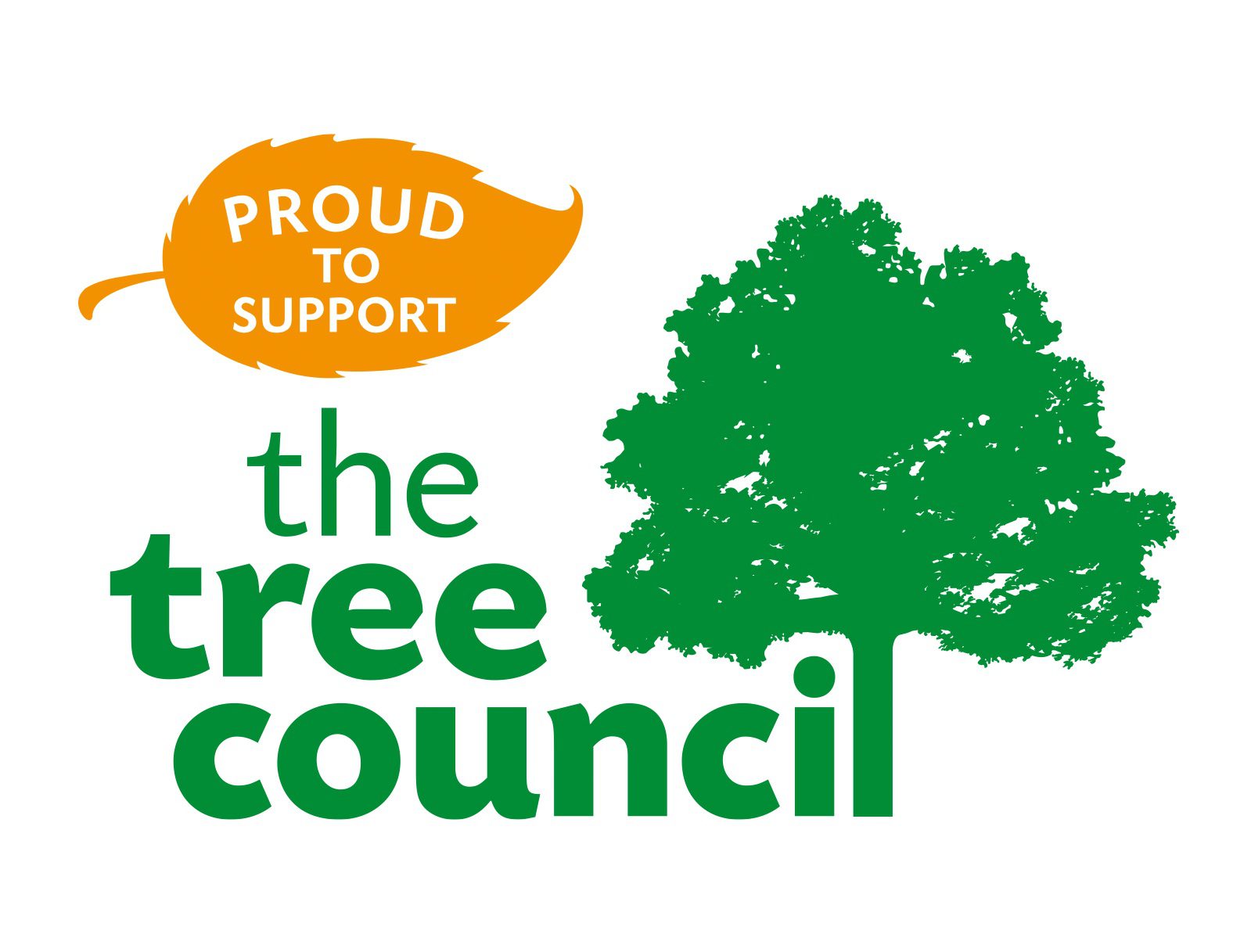
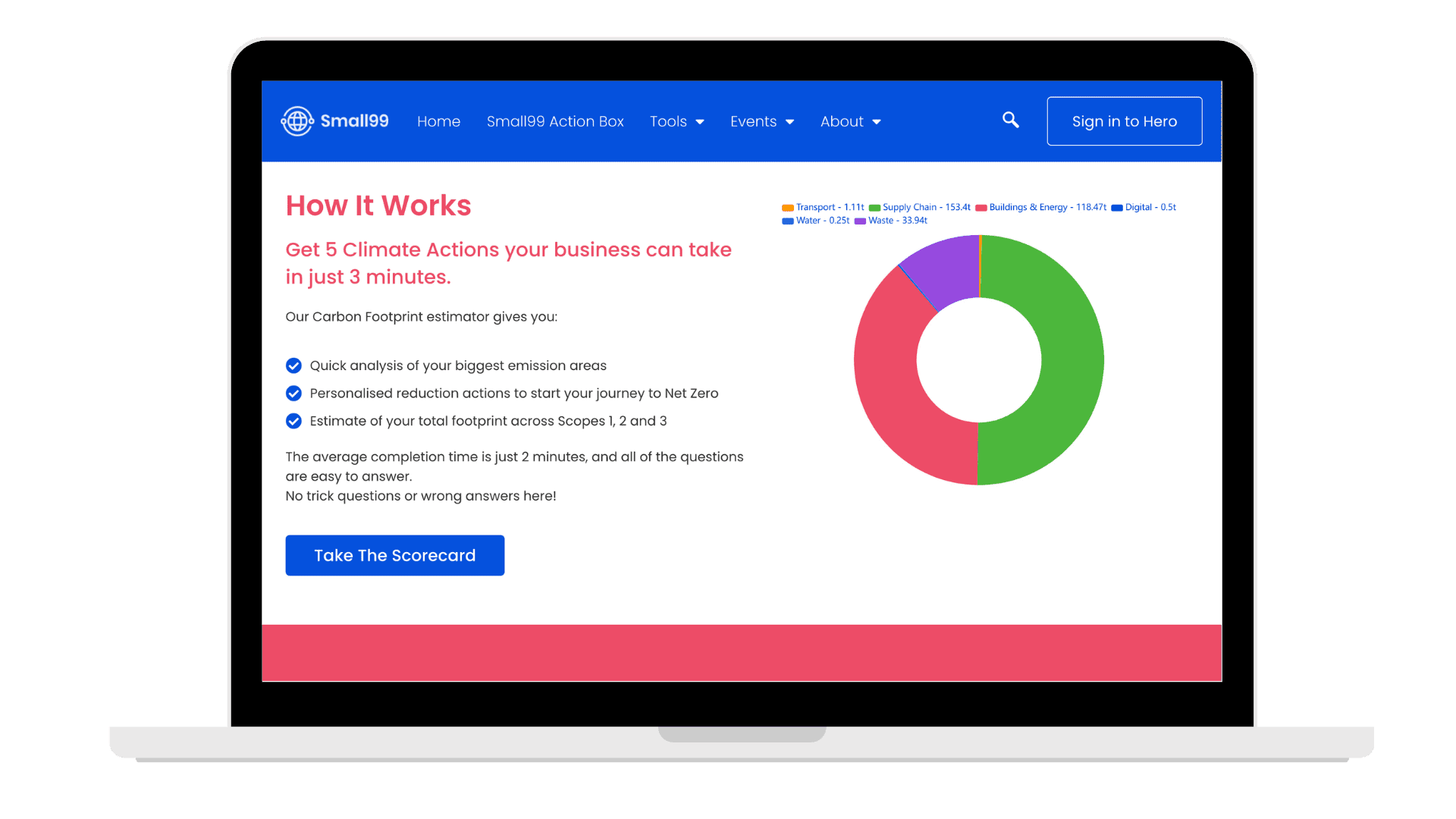
You could consider joining a scheme such as Small99, which was founded to guide the 99% of the economy that are small businesses towards Net Zero. Small 99 will provide your business with a comprehensive toolkit that will help reduce your carbon footprint and develop an action plan. At Rather Inventive we understand the importance of schemes like this for supporting our journey to sustainability and are proud to be members.
Taking the first step towards zero emissions is easy, especially with Local Authorities working with Government to help meet its net zero carbon ambitions by 2050. For instance, Gloucestershire’s Growth Hub hosts an annual Net Zero conference, bringing together Gloucestershire businesses to share valuable insights from their experience; offering inspiring and creative ways local businesses can help tackle climate change. This year’s themes include carbon auditing, net zero product development, social value, green skills and innovation in carbon capture. Gloucestershire Growth Hub also offer free sustainability support to help local firms ‘go green’ in 2024. There will be support for businesses in your local area too.
Eco-friendly packaging
Did you know that plastic packaging and containers account for half of all plastics in the world? Our global culture of disposable consumption is concerning, and it’s getting more so. Globally, we create around 141 million tonnes of plastic packaging annually and eight million tonnes of this ends up in the ocean. Despite the promises and good intentions, only 9% of the plastic produced globally is recycled. The other 91% is sent to landfills, burned in incinerators, or dumped in nature.
However, in response to this crisis, we’re seeing huge numbers of businesses in all industries moving towards eco-friendly packaging, replacing single-use plastics with biodegradable, recyclable, or reusable materials. Major brands like Nestlé and Coca-Cola have committed to 100% recyclable packaging by 2025. E-commerce companies are also innovating with minimalistic packaging designs that use less material, reduces waste and reduces transport emissions.
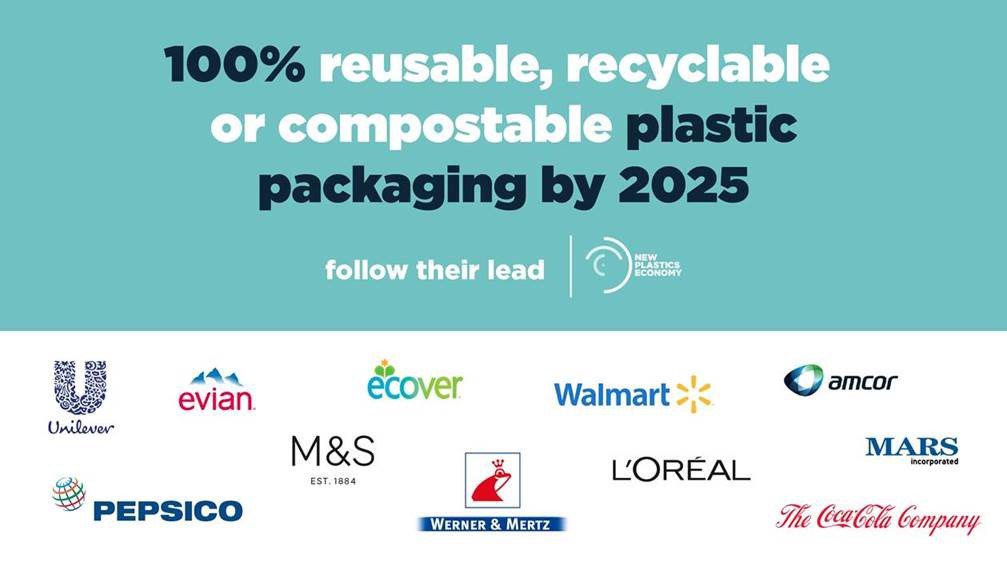
Recognising the scale of the problem and the need for swift action, governments are beginning to regulate packaging companies and new government incentives for sustainable packaging are being established, including subsidies and favourable taxes that can help smaller businesses make the transition. Consumers are demanding action from brands too. Bain & Co.’s study shows that a vast majority of consumers want to purchase sustainable products and those with minimal packaging.
The demand for sustainable alternatives extends to consumer habits too. Many of us choose to carry reusable shopping bags, water bottles, and coffee cups to cut down on single-use plastics. Retailers are responding by encouraging these habits, with some offering discounts or loyalty points to customers who bring their own bags or cups. York Uni’s study on consumer habits and behaviours relating to reusable packaging shows support for reusables with *84% of respondents wanting more businesses to offer reusable packaging options.
How can your small business reduce plastic packaging?
We can all do something. Can you provide paper alternatives to packaging, for instance? With increasing numbers of consumers demanding sustainable alternatives, it makes good business sense to respond with positive action.
Circular economy practices
Another way that consumers are demanding action from businesses is by supporting those that embrace circular economy practices. Increasing numbers of larger businesses are designing products that can be reused, repaired, or recycled. Companies such as IKEA and H&M have introduced product take-back schemes, where customers can return old goods for recycling or refurbishment, and there are many more.

Another example is in the context of the technology industry. Currently, the tech industry’s carbon footprint ranges between 5 to 10 per cent of all greenhouse gas emissions globally. The circular economy approach involves designing products and systems focusing on longevity, reuse, and recycling rather than the conventional production, consumption, and disposal. Which, after so many decades, has led to an alarming accumulation of electronic waste. The environmental repercussions of this include soil and water contamination from hazardous materials present in electronics, as well as the inefficient use of valuable resources. Circular tech economies aim to create closed-loop systems, minimising waste and maximising the value of resources through refurbishment, remanufacturing, and recycling. Companies like Apple and Dell have implemented take-back programmes, encouraging customers to return old devices for proper disposal or refurbishment.
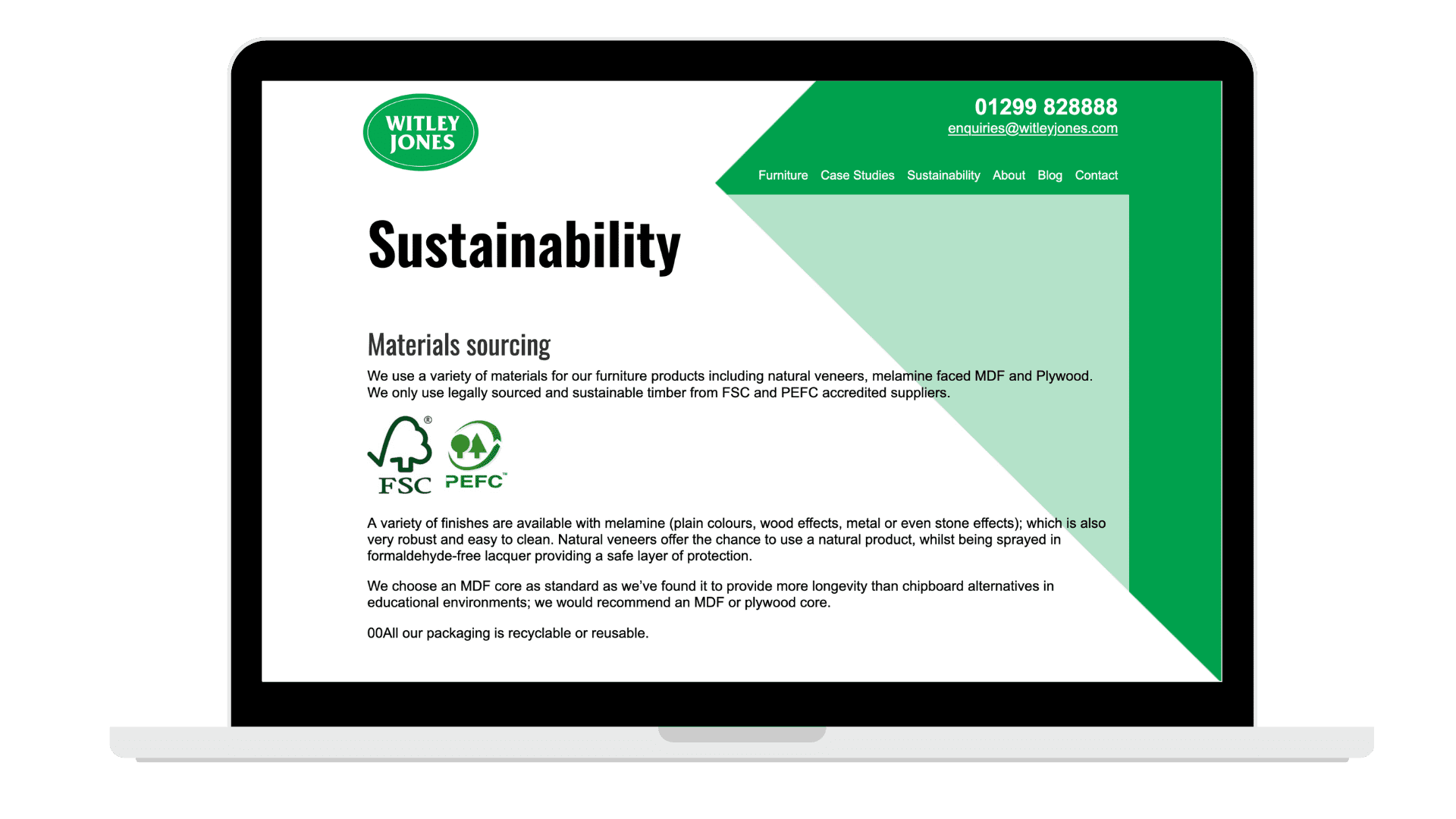
Smaller companies too are being more considered in their approach to waste. Our clients Witley Jones, who design, manufacture and install furniture for schools throughout the UK, will recycle or reuse their packaging and generate renewable energy through their biomass and extraction system using waste products and offcuts from the furniture. The power is used to heat their offices and factory, which significantly reduces the quantity of waste that they send to landfill, but it also means that they have lower running costs.
Supporting sustainable brands
As consumers become more environmentally astute, they are demanding more accountability and greener options. The influence of consumers is an important issue, because according to Deloitte’s latest research (2023), increasing numbers of consumers consider sustainability when making a purchase. Many are opting to buy only from brands that prioritise sustainability.
Businesses that emphasise eco-friendly practices, transparency in sourcing, and commitments to reducing emissions are increasingly gaining customer loyalty. And the research bears this out with revenue from sustainable products growing at about six times the rate of other products.
It doesn’t take much effort to be more sustainable. Seeking to source materials from sustainable sources, using biodegradable packaging, or stepping up recycling contributes massively. Our clients, Park Display, actively search for materials from sustainable sources, and where possible, they ensure that their clients’ displays can be reused and recycled, which minimises waste but also saves their clients money.
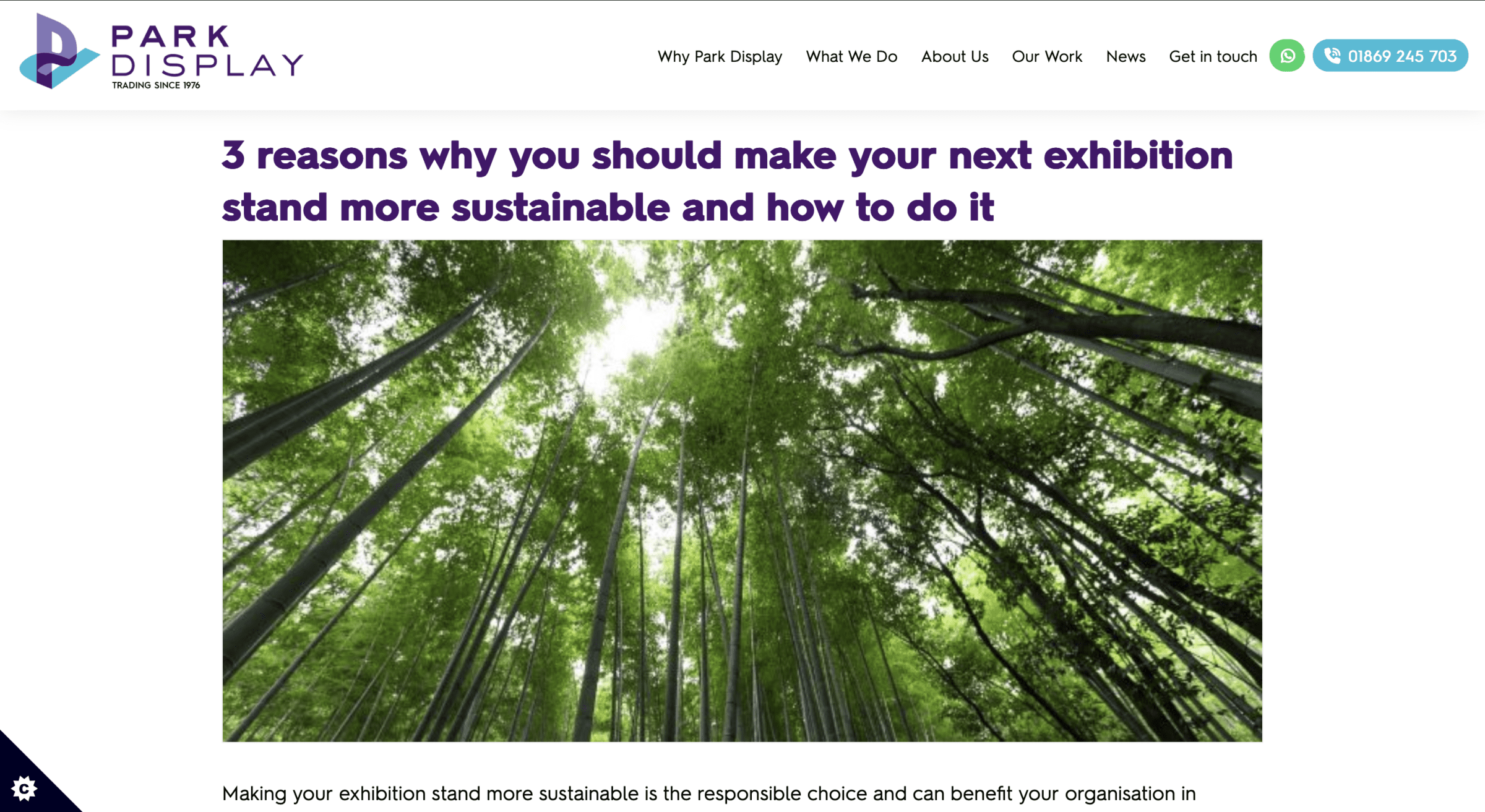
How can your business be more sustainable?
As consumers continue to prioritise sustainability in their purchasing decisions, companies that fail to embrace these values risk being left behind.
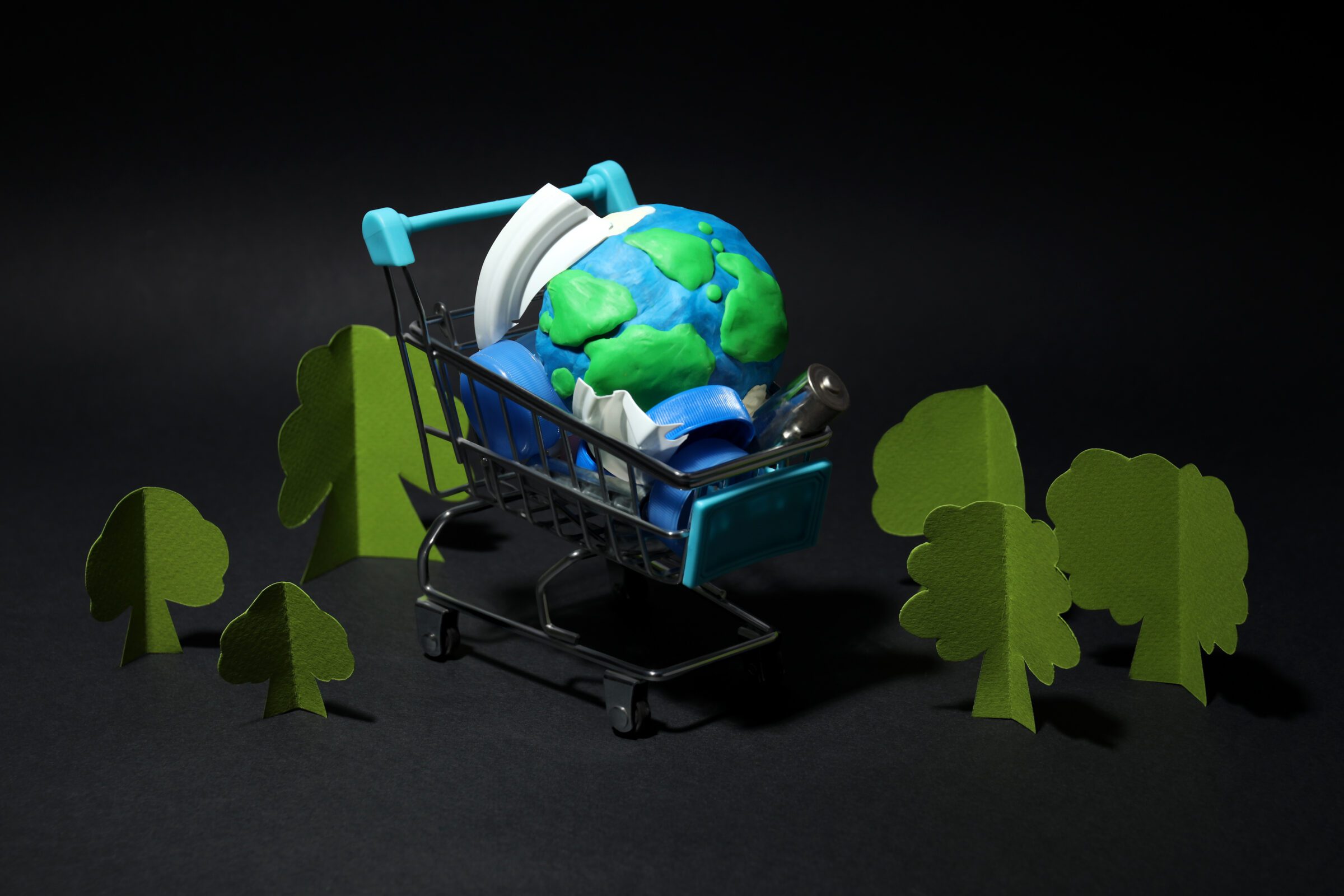
The rise and rise of conscious consumption
There is a steady rise in the numbers of consumers that are embracing conscious consumption—buying less, opting for second-hand goods, and repairing products rather than binning them. In response, there has been a drastic increase in the numbers of charity shops and resale platforms like Vinted and Poshmark, with new ones popping up regularly.
This reusing and repurposing explosion reflects a broader movement toward reducing waste, avoiding the manufacture of brand-new products (and therefore using virgin resources that are depleting the planet of the precious little it has left) and saving money. All of this is forcing companies to rethink their production strategies.
Think Adidas and how they make a range of their trainers from recycled plastic. Increasing numbers of businesses are following suit, even smaller ones are stepping up their commitment to eco-friendly materials in their products. Our clients, Work In Style, who make scrubs for healthcare professionals, have a range of products made from recycled plastic bottles.
We’re on the brink of a significant shift in consumption patterns, where truly sustainable brands — those that deliver on their promises to people and the planet — will take the advantage from brands that make flimsy claims or that have not invested sufficiently in sustainability. According to the latest NielsenIQ study:
- 55% of UK consumers say living sustainably is essential for society
- 18% say sustainability is an essential priority in their daily lives
- 30% are less likely to stop buying if a brand is found guilty of greenwashing
Greenwashing happens when companies make themselves look more eco-friendly than they are, aiming to appeal to environmentally conscious consumers. It’s surprisingly common—over 40% of green claims are said to be misleading. Often, companies introduce a single ‘sustainable’ product line to boost their sustainability image, while the bulk of their operations continue with environmentally harmful practices. This selective branding helps them gain a competitive edge, even though it doesn’t always reflect real commitment to sustainability.
In response, governments are cracking down. In the UK, a proposed bill introduced in April 2023 could see companies fined up to 10% of their global revenue if they make misleading claims about their environmental impact. The EU has taken similar steps, passing new rules in September 2023 that ban unsupported “climate-neutral” claims. Under this law, companies will have to provide real evidence to back up their eco-promotions.
How to spot greenwashing
A big clue that a company might be greenwashing is a lack of transparency. Businesses that truly prioritise sustainability usually offer measurable data, third-party certifications, and specifics about their practices. Greenwashing companies, on the other hand, rely heavily on vague slogans or attractive imagery. Another red flag is when a brand highlights a single “green” product while the rest of their products are anything but sustainable. Looking for trusted certifications like B Corp or Fair Trade and seeking brands committed to broader environmental improvements can help consumers see past the greenwashing.
Sustainability is a core value that is shaping the future of business. All the evidence suggest that being a socially responsible company that positively impacts the environment is the route to business survival. Across industries, companies are adopting renewable energy, eco-friendly practices, and innovative solutions to reduce their carbon footprint. As consumers continue to prioritise sustainability in their purchasing decisions, businesses that fail to embrace these values risk being left behind.
Whether you’re already on your way or just starting your journey towards sustainability, we’ve included in this article a number of links that we hope will provide inspiration and actions for starting or continuing your journey to a more sustainable business.

